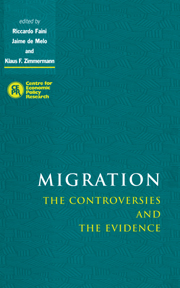Book contents
- Frontmatter
- Contents
- List of figures
- List of tables
- Foreword
- Acknowledgements
- List of conference participants
- 1 Trade and migration: an introduction
- PART ONE INSIGHTS FROM THEORY
- PART TWO QUANTIFYING THE LINKS BETWEEN TRADE AND MIGRATION
- 6 Trade and migration: a production-theory approach
- Discussion
- 7 Migration, dual labour markets and social welfare in a small open economy
- Discussion
- 8 Globalisation and migratory pressures from developing countries: a simulation analysis
- Discussion
- PART THREE HISTORICAL AND CONTEMPORARY EVIDENCE
- Index
7 - Migration, dual labour markets and social welfare in a small open economy
from PART TWO - QUANTIFYING THE LINKS BETWEEN TRADE AND MIGRATION
Published online by Cambridge University Press: 10 May 2010
- Frontmatter
- Contents
- List of figures
- List of tables
- Foreword
- Acknowledgements
- List of conference participants
- 1 Trade and migration: an introduction
- PART ONE INSIGHTS FROM THEORY
- PART TWO QUANTIFYING THE LINKS BETWEEN TRADE AND MIGRATION
- 6 Trade and migration: a production-theory approach
- Discussion
- 7 Migration, dual labour markets and social welfare in a small open economy
- Discussion
- 8 Globalisation and migratory pressures from developing countries: a simulation analysis
- Discussion
- PART THREE HISTORICAL AND CONTEMPORARY EVIDENCE
- Index
Summary
Introduction
In most European countries, liberal immigration policies came to a halt in the 1970s. More recently, hostility towards immigrants seems to be growing again and immigration is increasingly seen as having negative consequences for the host country, especially if immigrants are unskilled. This attitude is in contrast to the ‘guest-worker’ policy of the 1950s and 1960s when large numbers of unskilled workers migrated to North European countries. At that time, their arrival was seen as largely beneficial for the host countries. Entrepreneurs in labour-intensive industries saw immigration as an alternative to protection, in the context of increasing import competition from developing economies (Bhagwati, 1982). The shift towards more restrictive immigration policies in the 1970s was accompanied by a resurgence of protection. The steady reduction in tariff protection since 1947 was offset in the 1970s and 1980s by the growth of non-tariff barriers (Bhagwati, 1988).
How can these changes in migration and trade policies be explained? They are often imputed to macroeconomic difficulties and to rising unemployment in Europe. However, there is no obvious relation between protection and unemployment and most empirical analyses fail to find a link between immigration and unemployment. In this chapter, I explore an alternative explanation of these developments. Starting from Bhagwati's (1982) discussion of the choice between protection and immigration policy, I extend his analysis by focusing on a more complete representation of the ‘guest-worker’ system, and by taking income distribution explicitly into account.
Indeed, the standard welfare analysis of migration fails to explain the observed attitudes towards immigration. According to the utilitarian welfare criterion, immigration yields a surplus to the host country.
- Type
- Chapter
- Information
- MigrationThe Controversies and the Evidence, pp. 151 - 184Publisher: Cambridge University PressPrint publication year: 1999
- 1
- Cited by



